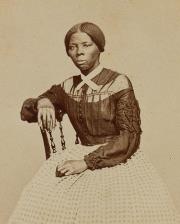
The Union Army recruited Harriet Tubman to work as a covert operative as described in Parts 1 and II of this series on this brave leader. She traveled to a Union Army camp in South Carolina supposedly to aid the former Black slaves who had been given sanctuary with the Union troops, but she was there for espionage work on behalf of the Union. The skills Tubman had acquired as a conductor on the Underground Railroad served her work as a covert operative for the Union. Because she was from Maryland and not South Carolina, she was not familiar with the ways of South Carolina or their dialect, which made communication with them difficult. They resented the rations the Union Army gave to her. To gain their trust and be able to gather relevant information from them, Harriet Tubman gave away her Army rations to them.
Eventually Tubman gained their trust and confidence to gather information to help the Union troops. She organized a group of trusted scouts to draw maps of waterways and land, and she espionage scouted the areas herself. The Union’s Secret Service gave her money in 1863, which she used to pay those who gave her useful information on the location and movement of Confederate troops, locations of mines, mounted guns and artillery, supplies and storage of weapons, ammunition, and related war equipment.
The Union then gave Harriet Tubman her new orders for her to organize an espionage ring to help the Union Armed Forces defeat the Confederate States Armed Forces, which included the Confederate States Navy established by an act of the Confederate States Congress on February 21, 1861. The major tasks of the Confederate States Navy during the Civil War were the protection of Confederate harbors and coastlines from invasion, including prevention of Union military raids against powerful plantations, and drawing off Union ships in pursuit of Confederate warships and commerce raiders.
Harriet Tubman had a unique knowledge and skill set, enabling her to gather information about the opposing Confederate forces by communicating with former slaves from the area. In order to lead enslaved people to Canada, in her years of guiding people away from slavery on the Underground Railroad, she had already acted as a covert operative. Her years working as a conductor on the Underground Railroad gave her particular knowledge and skills unique only to her. She had to have innovative, revolutionary and worldly-smart common sense to be successful in espionage and arrange covert meetings. She had to plan highly detailed routes without drawing attention to herself or others working on the Railroad. She was forced to make wise decisions quickly and react instantly when things changed and did not go as she planned. She had to adapt any plan on a moment’s notice to keep herself and the persons she was leading out of danger of being caught.
Because it had been against the law to teach slaves to read, with harsh punishment for violators, Tubman was illiterate. Nevertheless, she committed to her memory a large volume of details and complex information that was advantageous to working as a successful covert operative for the Union. After slavery was legally abolished in the US, many formerly enslaved persons nevertheless had difficulties in access to becoming literate, due to the harsh apartheid laws instituted by many states. These apartheid laws and the ensuing Jim Crow culture against Blacks was equal in its severity to that of South Africa at its worst. Apartheid existed in some states in the US from the 1870's until the mid-1960's.
What You Can Do
I am an aggressive and compassionate employment law attorney who is experienced in successfully representing persons who were subjected to racial harassment and retaliation in the workplace and/or were fired. If you have experienced racism at work, or if you reported it and no action was taken, if you are thinking of resigning, or think you will be fired, or have been fired, it is important that you consult with an attorney who is experienced in discrimination.
If you are being subjected to workplace discrimination, contact Hope A. Lang, Attorney at Law today for a free consultation.
Hope A. Lang, Attorney at Law serves clients throughout New Jersey, including Bergen, Middlesex, Essex, Hudson, Monmouth, Ocean, Union, Camden, Passaic, and Morris Counties with locations in southern, central, western and northern NJ to meet with clients.